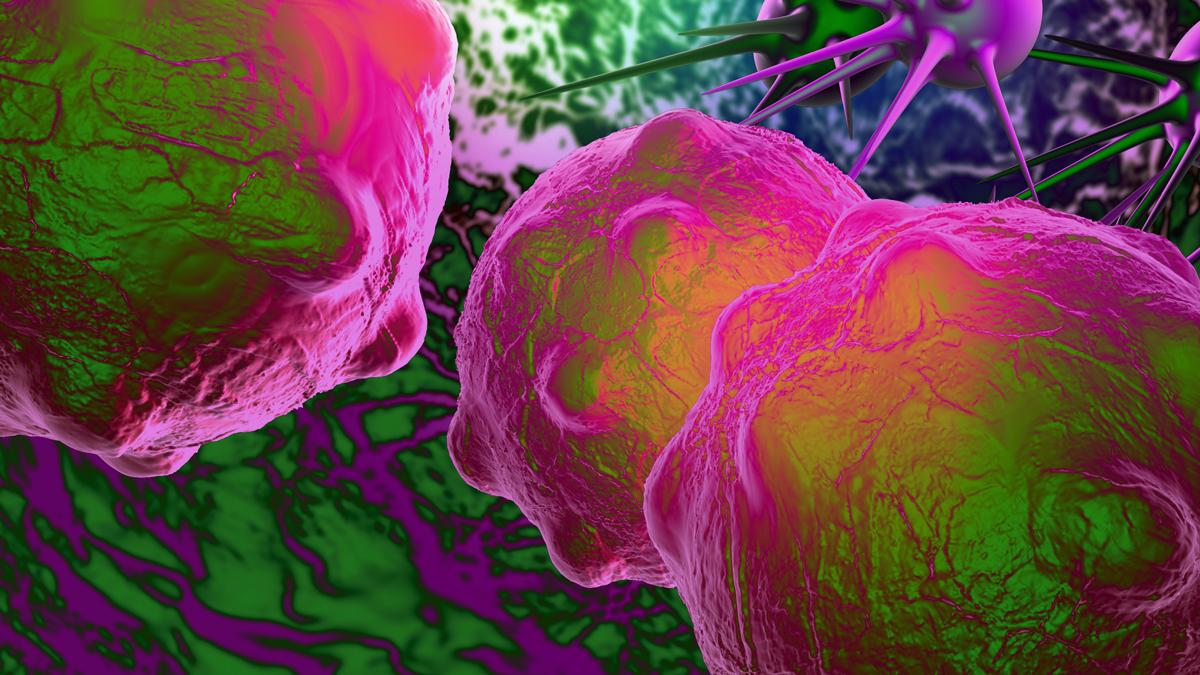Chimeric antigen receptor T-cells: Emerging uses and future directions

Genetic engineering technologies allow for the creation of custom-made cells that can have transformative effects on human health. This is best exemplified by chimeric antigen receptor (CAR) T-cells. Since first being tested in a patient nearly 15 years ago, six CAR T-cell products have been approved by the US Food and Drug Administration (FDA) for haematologic cancers, and dozens more have been tested in clinical trials.
CAR T-cells are engineered to express chimeric receptors that recognise antigens and drive cellular responses to those antigens. Upon antigen binding, the CAR elicits a signalling cascade that ends with the CAR T-cell destroying the target cell. All FDA-approved CAR T-cell products target surface proteins found on normal B-cells and B-cell-derived cancers. Data from clinical trials and post-marketing studies highlight the utility of these cells for some of the most difficult-to-treat cancers, with durable remissions and cures realistically attainable, even in those with recurrent disease or relapse after prior treatment.
Emerging uses of CAR T-cells
CAR T-cells have transformed the landscape of clinical care for several haematologic cancers. In many ways, however, we are just scratching the surface when it comes to the potential of CAR T-cells. Researchers are increasingly moving towards employing CAR T-cells in other disease areas, with particularly exciting results in autoimmunity and solid cancers.
Solid cancers: Solid tumours have been largely unresponsive to most CAR T-cells, including those approved by the FDA for various blood cancers. The difficulties with using CAR T-cells for solid cancers are easy to see, cancer cells hidden deep within a tumour are not as accessible as cancer cells circulating in the blood. In contrast to B-cell-derived blood cancers, in which nearly every cancer cell expresses the CD19 antigen, tumour cells are more heterogeneous in the antigens they express. On top of that, immunosuppression and nutrient limitation in the tumour microenvironment can dampen the effects of CAR T-cells.
For more than a decade, CAR T-cells have been developed to target different tumour antigens expressed on solid tumour cells. While the field overall has experienced mixed results, there have been several success stories for diverse solid cancers. These include using anti-mesothelin CAR T-cells to treat metastatic pancreatic cancer, anti-plastin cells for metastatic triple-negative breast cancer, anti-NY-ESO-1 cells for recurrent small cell lung cancer, anti-PD-L1 cells for metastatic melanoma and, most recently, anti-EGFRvIII cells for recurrent glioblastoma.1 Boosted by these successes, CAR T-cells for solid tumours are currently being tested in more than 40 clinical trials in the US, collectively covering more than 30 distinct tumour antigens and diverse cancer types.2
Autoimmune diseases: As noted above, FDA-approved CAR T-cell products recognise and bind to antigens present on the surface of B-cells, leading to their destruction. Not surprisingly, CAR T-cell-mediated depletion of B-cells has a major impact on the body and can lead to anaemias and opportunistic infections in patients. While the destruction of normal bystander B-cells is an undesirable side effect for those with cancer, that may not be the case for people living with autoimmune diseases.
Many autoimmune diseases are caused by the production and activity of autoantibodies, B-cell-derived antibodies that recognise self-antigens instead of foreign antigens. Given the role B-cells play in producing these autoantibodies, researchers have recently begun exploring the utility of CD19-specific CAR T-cells for the treatment of autoimmune diseases.
Early results in this area have been extremely promising. Preclinical studies in animal models of lupus showed CD19-directed CAR T-cells could virtually eliminate the production of autoantibodies and alleviate disease.3 In humans, a recent case series highlighted the profound impact that CAR T-cells can have on those living with autoimmune disorders.4 The study focused on just 15 patients, but CAR T-cells led to rapid depletion of autoantibodies and were so effective that every patient was able to stop their immunosuppressive therapy. While patients experienced side effects, including some infections, they were manageable and largely overlapped with those seen in cancer patients.
What’s next?
In addition to expanding into other indications, there has been a concerted effort in the field to improve upon existing therapies by modifying manufacturing processes to make cells safer and available quicker to patients in need.
Timely access to treatment: Like many new biologics, one of the biggest challenges facing CAR T-cell technologies is ensuring timely access to treatment. All FDA-approved CAR T-cells are autologous, meaning T-cells must be collected from the patient individually, genetically modified in a laboratory, and then reinfused back into the patient. This process can take anywhere from 6-12 weeks and can be problematic for patients who have failed prior therapies and for whom time is of the essence.5 To get around this, the field is increasingly moving towards an allogeneic approach, where T-cells are sourced from a single donor and genetically engineered for use in any patient while avoiding adverse rejection-related side effects (e.g., graft-versus-host disease). In this light, the creation of allogeneic CAR T-cell libraries covering diverse cancer antigens is a realistic goal. Such an approach would ensure lot-to-lot consistency across patients and allow physicians to quickly select an appropriate CAR T-cell product “off the shelf” like most other available therapeutics.
Improving short-term safety: CAR T-cells come with unique short-term and long-term risks related to their cytotoxic activity and the genetic engineering processes used to create the cells. The most significant short-term risks include B-cell anaemias, cytokine release syndrome, and neurotoxicities, all of which are directly linked to the destruction of antigen-expressing cells following administration. These side effects require close monitoring and management, including administration of IL-6 inhibitors and supplemental intravenous immune globulin, when appropriate. While these options are available, avoiding these severe side effects while preserving CAR T-cell efficacy would be ideal. To this end, several groups have begun testing mRNA-modified CAR T-cells, where the CAR transgene is transiently expressed from exogenous mRNA, rather than from the cellular genome after stable, permanent insertion. This, in theory, would allow CAR T-cells to work with varying intensities as a way to avoid or lessen the dramatic inflammatory responses seen following tumour cell destruction.6
Improving long-term safety: In contrast to mRNA-modified cells, all FDA-approved CAR T-cell products are modified using viral vectors that drive permanent integration of the CAR transgene into the cellular genome. This ensures sustained expression of the CAR on the T-cell surface, but transgene integration at the wrong place in the genome can come with serious consequences. For example, CAR transgene insertions that disrupt the activity of tumour suppressor genes or enhance the activity of oncogenes can drive the formation of new cancers.
For these reasons, the FDA recommends monitoring clinical trial participants for 15 years after dosing for signs of new cancers.7 Several recent reports from clinical trials and post-marketing sources have noted secondary T-cell cancers in patients treated with CAR T-cells.8 A clear link between new cancers and CAR T-cells has not been proven for all of these reports. However, they include at least one case of CAR-positive T-cell lymphoma, suggesting a causal relationship to the CAR transgene and/or its insertion site.9 The use of newer gene editing systems that can drive highly specific targeted transgene insertion, like CRISPR/Cas-based systems, should substantially reduce this risk.
References
- Amin DS, Mohamed Khosroshahi L, Sarkesh A, Mardi A, Aghebati-Maleki A, Aghebati-Maleki L, Baradaran B. 2023. The current landscape of CAR T-cell therapy for solid tumors: Mechanisms, research progress, challenges, and counterstrategies. Front Immunol 14:1113882. https://doi.org/10.3389/fimmu.2023.1113882.
- ClinicalTrials.gov. [accessed 2024 Jun 25]. Search results for "CAR T" "solid." Available from: https://clinicaltrials.gov/search?term=%22CAR%20T%22%20%22solid%22.
- Kansal R, Richardson N, Neeli I, Khawaja S, Chamberlain D, Ghani M, Ghani QU, Balazs L, Beranova-Giorgianni S, Giorgianni F, Kochenderfer JN, Marion T, Albritton LM, Radic M. 2019. Sustained B cell depletion by CD19-targeted CAR T cells is a highly effective treatment for murine lupus. Sci Transl Med 11(482). https://doi.org/10.1126/scitranslmed.aav1648.
- Müller F, Taubmann J, Bucci L, Wilhelm A, Bergmann C, Völkl S, Aigner M, Rothe T, Minopoulou I, Tur C, Knitza J, Kharboutli S, Kretschmann S, Vasova I, Spoerl S, Reimann H, Munoz L, Gerlach RG, Schäfer S, Grieshaber-Bouyer R, Korganow AS, Farge-Bancel D, Mougiakakos D, Bozec A, Winkler T, Krönke G, Mackensen A, Schett G. 2024. CD19 CAR T-Cell Therapy in Autoimmune Disease - A Case Series with Follow-up. N Engl J Med 390(8):687-700. https://doi.org/10.1056/NEJMoa2308917.
- Ceja MA, Khericha M, Harris CM, Puig-Saus C, Chen YY. 2024. CAR T cell manufacturing: Major process parameters and next-generation strategies. J Exp Med 221(2). https://doi.org/10.1084/jem.20230903.
- Moretti A, Ponzo M, Nicolette CA, Tcherepanova IY, Biondi A, Magnani CF. 2022. The Past, Present, and Future of Non-Viral CAR T Cells. Front Immunol 13:867013. https://doi.org/10.3389/fimmu.2022.867013.
- FDA. 2024. Considerations for the Development of Chimeric Antigen Receptor (CAR) T Cell Products: Guidance for Industry. U.S. Department of Health and Human Services, Food and Drug Administration, Center for Biologics Evaluation and Research. January 2024. Available from: https://www.fda.gov/media/156896/download.
- FDA. [accessed 2024 Jun 25]. FDA requires boxed warning for T-cell malignancies following treatment with BCMA-directed or CD19-directed therapies. Available from: https://www.fda.gov/vaccines-blood-biologics/safety-availability-biologics/fda-requires-boxed-warning-t-cell-malignancies-following-treatment-bcma-directed-or-cd19-directed.
- FDA. [accessed 2024 Jun 25]. FDA investigating serious risk of T-cell malignancy following BCMA-directed or CD19-directed autologous therapies. Available from: https://www.fda.gov/vaccines-blood-biologics/safety-availability-biologics/fda-investigating-serious-risk-t-cell-malignancy-following-bcma-directed-or-cd19-directed-autologous.













